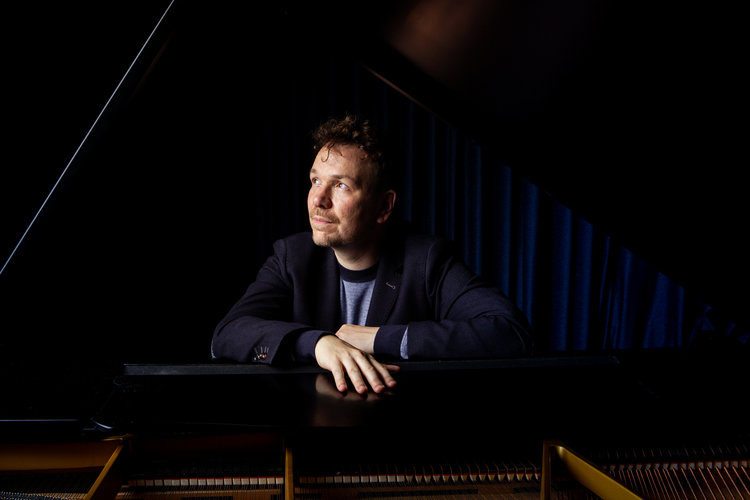[:en]The Forberg-Schneider Foundation is awarding the 2020 Belmont Prize with its € 20,000 cash endowment to the jazz pianist-composer Florian Weber, a musician they consider a seminal innovator in contemporary music.
Florian Weber’s musical frame of reference seems inexhaustible: it ranges from Maurice Ravel, Arnold Schoenberg and Karlheinz Stockhausen to Lee Konitz, John Taylor, Paul Bley and even so-called world music. The mainstay of his music is improvisation. To quote the Foundation’s Board of Trustees: ‘His piano playing is as boundless in its possibilities as it is economical and focused. Instead of post-modern gestures he works with the musical substance.’
Florian Weber (born 1977) gained the respect of authoritative jazz musicians early in his career. While still a student in Cologne and at the Berklee College of Music in Boston he played on stage or in the studio with such masters of improvisation as Michael Brecker, Albert Mangelsdorff, Eddie Henderson and Benny Bailey. He also acquired international renown with his trio Minsarah and its eponymous début CD (2006). Lee Konitz, his subsequent mentor, joined Minsarah to record ‘Deep Lee’ (2007) and the legendary concert ‘Live at the Village Vanguard’ (2012).
Florian Weber views improvisation as a modern and spontaneous form of composing, sustained by open-mindedness and a great love of discovery. His most recent New York quartet consists of musicians who ‘interest him most of all for the differences between them and their improvisational techniques’. The result of their collaboration, ‘Lucent Waters’, appeared on the ECM label in late 2018 to ecstatic reviews from the trade press. The New York Times lauded his ‘aesthetic of aerodynamic fluency’ that never seeks to grandstand or overpower and thrives on an enormously flexible, lucid and protean piano sound.
In his latest program Florian Weber includes members of Frankfurt’s Ensemble Modern and draws inspiration from ‘coalition chess’ (a variant form of chess devised by Arnold Schoenberg), taking into account not only its game rules. This program will have its première at the end of October, that much can be revealed. Further information will be available at the Pierre-Boulez-Saal program release for the 2020/2021 season on 10 June.
The son of an opera singer and a music professor, Florian Weber came into contact with classical music and the piano at an early age. At first his seemingly foreordained path led him to study mathematics, physics and biology – a clear indication of the universal interests that come to the fore again and again in his music. Florian Weber lives alternately in Osnabrück and New York. He teaches at institutes of higher learning both in Germany and abroad.
 [:de]The Forberg-Schneider Foundation is awarding the 2020 Belmont Prize with its € 20,000 cash endowment to the jazz pianist-composer Florian Weber, a musician they consider a seminal innovator in contemporary music.
[:de]The Forberg-Schneider Foundation is awarding the 2020 Belmont Prize with its € 20,000 cash endowment to the jazz pianist-composer Florian Weber, a musician they consider a seminal innovator in contemporary music.
Florian Weber’s musical frame of reference seems inexhaustible: it ranges from Maurice Ravel, Arnold Schoenberg and Karlheinz Stockhausen to Lee Konitz, John Taylor, Paul Bley and even so-called world music. The mainstay of his music is improvisation. To quote the Foundation’s Board of Trustees: ‘His piano playing is as boundless in its possibilities as it is economical and focused. Instead of post-modern gestures he works with the musical substance.’
Florian Weber (born 1977) gained the respect of authoritative jazz musicians early in his career. While still a student in Cologne and at the Berklee College of Music in Boston he played on stage or in the studio with such masters of improvisation as Michael Brecker, Albert Mangelsdorff, Eddie Henderson and Benny Bailey. He also acquired international renown with his trio Minsarah and its eponymous début CD (2006). Lee Konitz, his subsequent mentor, joined Minsarah to record ‘Deep Lee’ (2007) and the legendary concert ‘Live at the Village Vanguard’ (2012).
Florian Weber views improvisation as a modern and spontaneous form of composing, sustained by open-mindedness and a great love of discovery. His most recent New York quartet consists of musicians who ‘interest him most of all for the differences between them and their improvisational techniques’. The result of their collaboration, ‘Lucent Waters’, appeared on the ECM label in late 2018 to ecstatic reviews from the trade press. The New York Times lauded his ‘aesthetic of aerodynamic fluency’ that never seeks to grandstand or overpower and thrives on an enormously flexible, lucid and protean piano sound.
In his latest program Florian Weber includes members of Frankfurt’s Ensemble Modern and draws inspiration from ‘coalition chess’ (a variant form of chess devised by Arnold Schoenberg), taking into account not only its game rules. This program will have its première at the end of October, that much can be revealed. Further information will be available at the Pierre-Boulez-Saal program release for the 2020/2021 season on 10 June.
The son of an opera singer and a music professor, Florian Weber came into contact with classical music and the piano at an early age. At first his seemingly foreordained path led him to study mathematics, physics and biology – a clear indication of the universal interests that come to the fore again and again in his music. Florian Weber lives alternately in Osnabrück and New York. He teaches at institutes of higher learning both in Germany and abroad
. [:]
[:]
